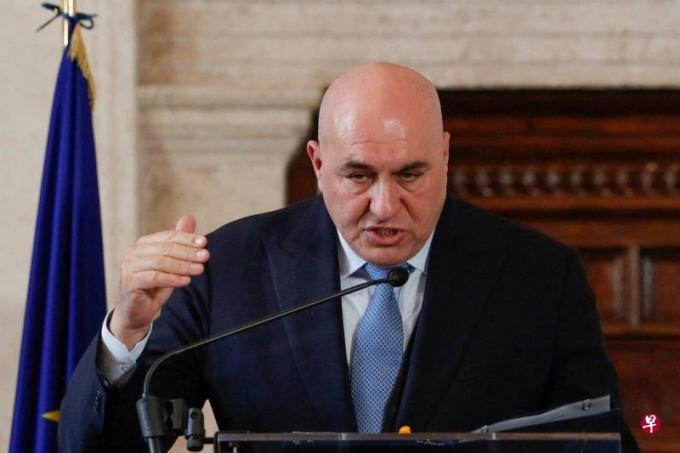
The Italian government recently issued a signal to withdraw from the "Belt and Road" cooperation. The new Prime Minister Melonney Melonney said on July 27 after meeting with the US President Biden that he was still discussing how to deal with the "Belt and Road" initiative.In an interview published by the Milan Evening Post Post on July 30, Minister of Defense pointed out that joining the China “Belt and Road” initiative four years ago was a decision to “hasty and bad” because it almost did not promote exports.If Italy decides to terminate cooperation, it will be another frustration of China's diplomatic and even international geopolitics.
The "Belt and Road" agreement will expire in March next year, and Italy must clearly withdraw from the decision in December, otherwise it will automatically renew the contract.Italy's original meaning of joining the "Belt and Road" was to attract more Chinese investment and expand exports to China, but in 2022, it exported to China 16.4 billion euros (about $ 24.181 million), which was only slightly higher than 13 billion euros in 2019. On the other hand,China ’s exports have increased from 31.7 billion euros in 2019 to 57.5 billion euros in 2022.Germany and France, which did not join the "Belt and Road", grew higher than that of China export digits at the same time than Italy.No wonder the Italian Foreign Minister Tagani complained on June 20 that joining the "Belt and Road" has benefited little.
Italy, the chairman of the Seventh Kingdom Group next year, is the only member of the group to join the “Belt and Road” and was regarded as an important gain of Chinese diplomacy at the time.In the same way, if Italy is now withdrawn, the impact will not be underestimated.Especially in the current US -China game, the Western group has gradually condensed consensus, regarding China's rise as a strategic risk or even threat, and adopting different strategies to be enclosed.Directed by the United States, the economic decourse that has responded to different degrees of economic decourse with China, Japan, South Korea, Australia, and Canada has formed a trend of reorganization against globalization and the world supply chain.China proposed the "Belt and Road" in 2013, and at the beginning, it intends to take it as an important means to prevent being blocked.
China strives to join the “Belt and Road” in Italy. It has repeatedly emphasized that European countries and the European Union must adopt a “independent” diplomatic route to weaken the diplomatic pressure of Western groups to China.In addition, China also forms a "14+1" cooperation mechanism with members of the EU's non -seven -state group, especially the 14th and Eastern European countries, to further strengthen its diplomatic impact on Europe.However, with the outbreak of the Russian and Ukraine War, China did not explicitly condemn Russia's aggression, which made the Central and Eastern European countries dissatisfied with Beijing, which was worried about Russia's threat to Beijing, affected their interest in the "14+1" cooperation mechanism, and even fell to strongly support Ukraine to fight against Russia.The United States.
In addition to being the core of the "big country's diplomacy" national strategic core, countermeasures against Western diplomacy, the "Belt and Road" initiative also exports domestic excess capacity, expand China's influence in Southeast Asia, and protect energy security in Central Asia.Chinese President Xi Jinping proposed the concept of the "Silk Road Economic Belt" in Kazakhstan, Central Asia in September 2013. In October of the same year, he proposed the concept of the 21st Century "Maritime Silk Road" in Indonesia in October of the same year.Therefore, with Europe's concerns and hostility on the "Belt and Road", Beijing may strengthen diplomatic efforts in Central Asia and Southeast Asia.
The game from the United States and China has intensified, and the Western world's countermeasures on the "Belt and Road" have gradually been upgraded.The United States takes over the Indo -Pacific strategy proposed by Japan. In the field of military security, in the field of military security, in addition to the four -party security dialogue, Australia, Britain, and the United States, and strengthening the US, Japan and South Korea military cooperation, the "Indo -Pacific Economic Framework" is also established in the economic and trade field.The influence of all the way.Japan announced in March that in 2030, it promised a private investment and government loan of US $ 75 billion (about S $ 100.4 billion) to assist in the Indo -Pacific region and even the "Global Southern" countries.The European Union proposed the "Global Portal" infrastructure plan in 2021 to compete for the economic and political influence of the "Belt and Road".
On the 10th anniversary of the establishment of the “Belt and Road”, how China faces the “Italian challenge” and spillover effects on the current global geopolitical development.In some countries along the line, they do not consider cost benefits, and have accepted a large number of remaining production capacity in China to meet their own infrastructure needs, which has led to the high debt platforms and caught in the so -called "debt trap".At present, China's economic growth has slowed down, domestic unemployment and debt difficulties have emerged. Foreign capital output is not as good as before, and it also makes the "Belt and Road" lose a lot.It is believed that China must adjust the focus of the "Belt and Road" for its strength and avoid harm.Observe the "Belt and Road" trend, so we can grasp where Beijing's "big country diplomacy" goes.


